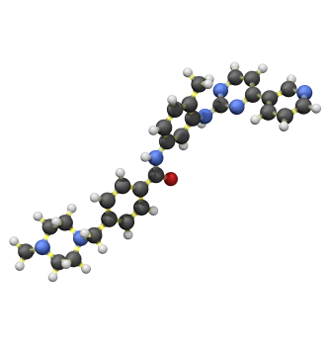Long-Term Treatment With Imatinib Affected Bone Mineral Density
A majority of patients on imatinib for treatment of GIST or CML had low or absent levels of osteocalcin, a bone marker secreted by osteoblasts, and about 50% of patients had a decrease in bone mineral density, signaling that long-term treatment may affect bone health in these patients.
Chemical structure of imatinib

A majority of patients on imatinib for treatment of gastrointestinal stromal tumor (GIST) or chronic myelogenous leukemia (CML) had low or absent levels of osteocalcin, a bone marker secreted by osteoblasts, and about 50% of patients had a decrease in bone mineral density, signaling that long-term treatment may affect bone health in these patients.
“We had previously published a paper in 2006 that showed that patients who take imatinib for CML or for GIST tumors have decreased activity for osteoblasts,” said Ellin Berman, MD, lead researcher on the study and a hematologist at Memorial Sloan-Kettering Cancer Center in New York. “We wanted to prospectively look at whether this had a clinical impact on patients.”
The results were published in Leukemia Research.
Berman and colleagues enrolled 28 patients with either CML or GIST, and prospectively analyzed levels of osteocalcin and serum N-telopeptide of type 1 collagen (NTX), a marker of bone resorption. Patients were on imatinib for a median of 31 months at baseline. Nineteen patients completed measures of bone mineral density at baseline, 1 year, and 2 years.
Ninety-five percent of the patients were found to have low levels of osteocalcin, and 37% of patients had no measurable amounts at least once during the study period.
Eleven patients (58%) had normal NTX levels. Only four patients (21%) had elevated levels of NTX, and four patients had low levels of NTX.
At 2 years, DEXA scans indicated that 47% of patients had a decrease in bone mineral density and 32% had no change. Seven of the nine patients with decreases saw significant changes at the total hip.
“Imatinib appears to halt or at least decrease bone growth,” Berman said. “Bone is always growing or remodeling. It slows when you are older, in postmenopausal women particularly, but it is always a living organ.”
The researchers were unable to identify any clinical characteristic or metabolic parameter that was associated with having decreased bone mineral density. However, they did point out that although it was not statistically significant, patients who had increases in bone mineral density were on imatinib for a shorter period prior to study entry (median 8.5 months) compared with patients who had decreased bone mineral density (median 27 months).
“Since current recommendations say to continue patients on imatinib indefinitely for CML, and long-term treatment is recommended in GIST, looking at bone mineral density should be incorporated,” Berman said. “For people who begin to lose bone density, bone supplementation with calcium, vitamin D, or maybe even hormonal therapy should be considered.”